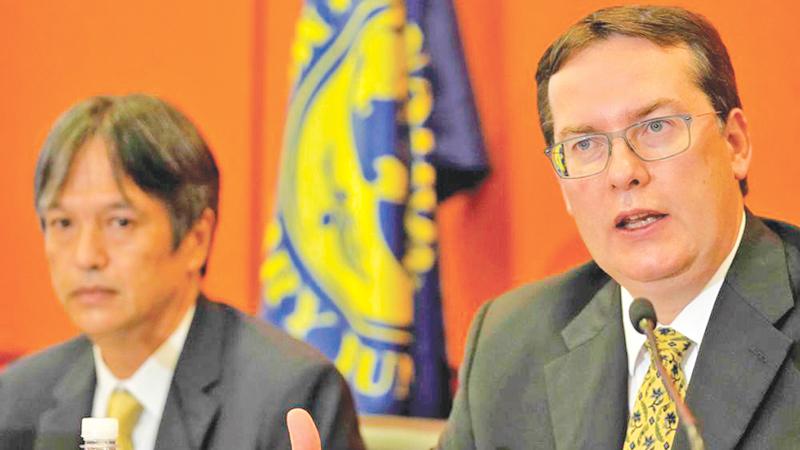
The staff level agreement reached with Sri Lanka to support the economy is a positive signal of the Sri Lankan authority’s commitment to policy reforms contingent for the implementation of the International Monetary Fund (IMF) backed support program, said Peter Breuer who led the IMF mission to Sri Lanka last week.
The agreement reached last week is an indication that Sri Lanka is serious about engaging in reform and ensuring debt sustainability, Breuer said. However, he noted that the staff level agreement is only the beginning of a long road ahead in implementing the commitments contingent on the final approval by the Executive Board of the IMF.
Assurance from creditors is contingent on going ahead with the support program, the IMF team said.
Debt relief from Sri Lanka’s creditors and additional financing from multilateral partners will be needed to help ensure debt sustainability and close financing gaps. Financing assurances to restore debt sustainability from Sri Lanka’s creditors and making a good faith effort to reach a collaborative agreement with private creditors are vital before the IMF could approve support to Sri Lanka, Masahiro Nozaki of the IMF mission said. When asked about China’s stance as a major creditor, Nozaki said if there is no assurance from creditors Sri Lanka’s crisis will deepen and undermine the country’s repayment capacity. Therefore, the collaboration by the debtors and creditors is crucial to ensure Sri Lanka’s repayment capacity, Nozaki said. China according to media reports said, “The ball is in Sri Lanka’s court” avoiding a direct reply to Sri Lanka’s request to restructure debt.
The Government has been urging China to help Sri Lanka get over the crisis by agreeing to a debt restructuring plan.
According to experts assurance from China on debt restructuring would depend on Sri Lanka emerging from the current economic crisis.
The 2023 Budget which is expected to be in line with the reforms is crucial the IMF team noted. Revised budget estimates project revenue to be two trillion rupees this year, down from the initial projection of 2.23 trillion while expenditure to rise to 4.4 trillion rupees surpassing previous estimates of 3.9 trillion rupees.
The IMF staff and the Sri Lanka reached a staff-level agreement to support the country’s economic policies with a 48-month arrangement under the Extended Fund Facility (EFF).
The agreement is subject to the approval of the IMF management and the executive board in the period ahead contingent on the implementation by authorities of prior actions and on receiving financing assurance from Sri Lanka’s official creditors
The objectives of the program are to restore macroeconomic stability and debt sustainability while safeguarding financial stability. Protecting the vulnerable and stepping up structural reforms to address corruption, vulnerabilities and unlock Sri Lanka’s growth potential.
An international Monetary Fund mission led by Peter Breuer and Masahiro Nozaki visited Colombo from August 24 to September 1 to continue discussions on IMF support for Sri Lanka and the government’s comprehensive reform program.
The IMF noted Sri Lanka has been facing an acute crisis. Vulnerabilities have grown owing to inadequate external buffers and an unsustainable public debt dynamic. The April debt moratorium led to Sri Lanka’s defaulting on the country’s external obligations, and a critical low level of foreign reserves has hampered the import of essential goods including fuel, further impending economic activity.
The economy is expected to contract by 8.7 percent in 2022 and inflation exceeded 60 percent recently. The impact has been borne disproportionately by the poor and vulnerable.
The global lender noted that the supported program lies on Sri Lanka raising fiscal revenue to support fiscal consolidation. Commencing from one of the lowest revenue levels in the world the program will implement major tax reforms which include making personal income more progressive and broadening the tax base for corporate income tax and VAT. The program aims to reach a primary surplus of 2.3 percent of GDP by 2024.
Introducing cost-recovery based pricing for fuel and electricity to minimize fiscal risks arising from state owned enterprises, mitigating the impact of the current crisis on the poor and the vulnerable by raising social spending and improving the coverage and targeting of social safety net programs, rebuilding foreign reserves through restoring a market determined and flexible exchange rate, supported by the comprehensive policy package under this category and reducing corruption vulnerabilities through improving fiscal transparency and public financial management, introducing a stronger anti corruption legal framework and conducting an in-depth governance diagnostic supported by the IMF technical assistance.
